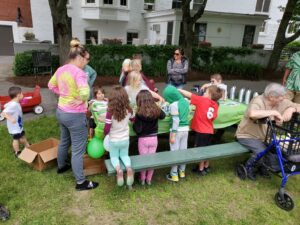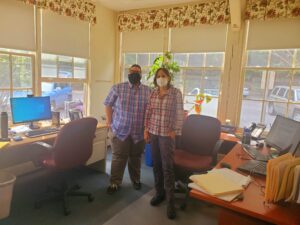
For Windham & Windsor Housing Trust, housing and supportive services have always gone hand-in-hand. The organization has a long history of developing quality housing solutions for its community’s most vulnerable populations, and has successfully forged dynamic partnerships to support the long-term resiliency, health and well-being of its residents. Now, the Housing Trust has taken a bold step further, with the creation and staffing of its first internal Supportive Services Department.
“Our thinking was, that it takes more than decent, responsible, affordable housing for people to be successful,” says Leo Schiff, board member and program committee co-chair. “Housing is a crucial foundation, but people have a lot of complex life challenges. The Housing Trust has a variety of strategies to help people be successful in our housing – and as an organization we wanted to focus on that more intentionally.”
Even before COVID, WWHT was exploring the advantages of providing more on-site support to residents. The early success of Great River Terrace and its model of permanent supportive housing showed the power of connection and belonging within a community. “That was a chance for us to learn a great deal about what kinds of services would help with housing success,” says program committee co-chair Kate Jellema. “Part of our vision on the program committee was to create a diverse, vibrant, respectful community, where all of our residents feel a sense of connection and well-being.”
Then came the pandemic, with its physical, mental, social and financial impacts. “COVID has affected the residents of the Housing Trust in really profound ways,” says Leo. “We’ve seen a heightened sense of this in our Great River Terrace community but also throughout the broader community. The isolation among people is palpable — people are looking for connections beyond their day to day lives. More than ever before, we’ve seen an enormous need for community building, connection and support, across every community.”

To meet this need, the organization hired Joyce St. Jean as Resident Services Manager and Garry Card as Housing Services Coordinator. Together, with support from the program committee, they are building the new department from the ground up. The department will also be adding a part-time community engagement person to work on implementing resident-driven community programs and activities.
“Because of the complex challenges that folks are having, what we’ve found is that there is conflict that’s being created amongst these communities,” explains Joyce. “We want to address that. The idea is to go in and meet with these residents on a one-on-one basis, and talk to them and find out where they are and what kind of challenges they are having. It’s all about building trust.”
That job of listening and building trust now falls to Garry Card. Since the program launched in late summer, he has already heard from over 50 residents, with more referrals coming in on a daily basis. The main focus of these early days for Garry is establishing those essential connections with residents and letting them know their voices are being heard.
Garry’s one-on-one meetings with residents have revealed a wide range of different issues, from income insecurity and not being able to pay rent, to tenant disputes that have built up during the pandemic lockdown. The end goal is to resolve those issues in a positive way.
“Right now it’s a lot of hearing people’s stories, what they’ve been doing the last year during pandemic time,” says Garry. “Some of it has also been about connecting tenants to other resources that are out there. The nice thing is that it builds a connection, and that opens the door to more meetings and more discussions, and eventually those tougher conversations.”
The recurring theme, says Garry, is that people want to feel connected. “That can mean their hometown community as a whole, or it could be their building, and just wanting to reestablish those connections. Trying to figure that out has been huge.”
There is another aspect of the program with tremendous value, says Kate Jellema, and that is the development of resident leadership within communities. “We have been talking a lot about resident empowerment and skill-building, for things like conflict resolution and de-escalation. We have that on the staff side, but it would be wonderful to build those competencies on the resident side.”
Joyce calls it an asset-based approach to community building. “We want to focus on the strengths of the individuals that are in those buildings. By tapping into those folks and looking at how we can all be in conversation together, we’re helping empower our residents. They are our greatest teachers.”
“There’s a lot of ground truthing when you have residents in the conversation,” says Kate. “And that has been extraordinarily helpful. One of the things we’ve heard is that it’s challenging to live in a community. A lot of our residents are looking for help dealing with some of this low-level friction that comes with sharing space with other people.”
Although the new department is still a work-in-progress, its potential for impact reaches every corner of the organization – particularly other Housing Trust staff who had been fielding these kinds of issues from residents.

